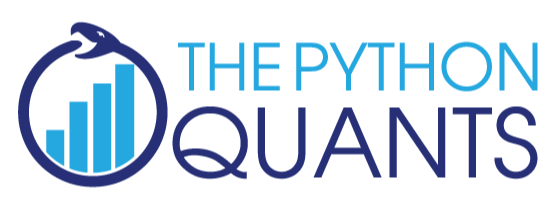|
# |
|
# Python Class for Technical Analysis |
|
# eg Based on Data from FXCM Financial Capital Markets Limited |
|
# |
|
# The Python Quants GmbH |
|
# October 2017 |
|
# |
|
# Note that this code and the data (service) accessed |
|
# by the code are for illustration purposes only. |
|
# They come with no warranties or representations, |
|
# to the extent permitted by applicable law. |
|
# |
|
# Read the RISK DISCLAIMER carefully. |
|
# |
|
# Status: Experimental |
|
# |
|
import numpy as np |
|
import pandas as pd |
|
pd.options.mode.chained_assignment = None |
|
|
|
class technical_indicators(object): |
|
""" A class to generate technical, financial indicators |
|
based on pandas DataFrame objects """ |
|
def __init__(self, data, index=''): |
|
if not isinstance(data, pd.DataFrame): |
|
raise TypeError('data must be a pandas DataFrame') |
|
self.data = data |
|
if index != "" and index in self.data.columns: |
|
self.data.set_index(index, inplace=True) |
|
|
|
def add_columns(self, data, name): |
|
""" Add columns to the data object """ |
|
self.data[name] = data |
|
|
|
def remove_columns(self, name): |
|
""" Remove the column with name 'name' """ |
|
self.data = self.data.drop([name], axis=1) |
|
|
|
def get_data(self): |
|
""" Return the data as pandas DataFrame object """ |
|
return self.data |
|
|
|
def check_periods(self, periods): |
|
try: |
|
periods = int(periods) |
|
except: |
|
raise TypeError('periods must be an integer') |
|
if periods < 1: |
|
raise TypeError('periods must be a positive integer') |
|
return periods |
|
|
|
def sma(self, column_name, periods): |
|
""" Return the simple moving average (SMA) of the data |
|
|
|
Arguments: |
|
========== |
|
column_name: string |
|
the name of the data set's column to use |
|
|
|
periods: integer |
|
the length of the time window |
|
|
|
Returns: |
|
======== |
|
sma: ndarray |
|
the simple moving average data set |
|
""" |
|
periods = self.check_periods(periods) |
|
sma = self.data[column_name].rolling(periods).mean() |
|
return sma |
|
|
|
def add_sma(self, column_name, periods): |
|
""" Add simple moving average (SMA) of the data |
|
|
|
Arguments: |
|
========== |
|
column_name: string |
|
the name of the data set's column to use |
|
|
|
periods: integer |
|
the length of the time window |
|
|
|
Returns: |
|
======== |
|
name: string |
|
the name of the added SMA column |
|
""" |
|
periods = self.check_periods(periods) |
|
name = 'sma_%s_%s' % (periods, column_name) |
|
data = self.sma(column_name, periods) |
|
self.add_columns(data, name) |
|
return name |
|
|
|
def ewma(self, column_name, periods): |
|
""" Return the exponential weighted moving average (EWMA) of the data |
|
|
|
Arguments: |
|
========== |
|
column_name: string, |
|
the name of the data set's column to use |
|
|
|
periods: integer, |
|
the length of the time window |
|
|
|
Returns: |
|
======== |
|
ewma: ndarray |
|
the exponentially weighted moving average (EWMA) data set |
|
""" |
|
periods = self.check_periods(periods) |
|
ewma = self.data[column_name].ewm(span=periods, |
|
min_periods=periods).mean() |
|
return ewma |
|
|
|
def add_ewma(self, column_name, periods): |
|
""" Add the exponential weighted moving average (EWMA) of the data |
|
|
|
Arguments: |
|
========== |
|
column_name: string |
|
the name of the data set's column to use |
|
|
|
periods: integer |
|
the length of the time window |
|
|
|
Returns: |
|
======== |
|
name: string |
|
name of the added EWMA column |
|
""" |
|
periods = self.check_periods(periods) |
|
name = 'ewma_%s_%s' % (periods, column_name) |
|
data = self.ewma(column_name, periods) |
|
self.add_columns(data, name) |
|
return name |
|
|
|
def bollinger_upper(self, column_name, periods): |
|
""" Return upper Bollinger band of the data |
|
|
|
Arguments: |
|
========== |
|
column_name: string |
|
the name of the data set's column to use |
|
|
|
periods: integer |
|
the length of the time window |
|
|
|
Returns: |
|
======== |
|
upper_bol: ndarray |
|
the upper Bollinger band data |
|
""" |
|
periods = self.check_periods(periods) |
|
stdev = self.data[column_name].rolling(periods).std() |
|
upper_bol = self.sma(column_name, periods) + (2 * stdev) |
|
return upper_bol |
|
|
|
def add_bollinger_upper(self, column_name, periods): |
|
""" Add upper Bollinger band to the data |
|
|
|
Arguments: |
|
========== |
|
|
|
column_name: string, |
|
the name of the dateset's column to use. |
|
|
|
periods: integer, |
|
the length of the time window. |
|
|
|
Returns: |
|
======== |
|
name: string |
|
the name of the added column |
|
""" |
|
periods = self.check_periods(periods) |
|
name = 'boll_up_%s_%s' % (periods, column_name) |
|
data = self.bollinger_upper(column_name, periods) |
|
self.add_columns(data, name) |
|
return name |
|
|
|
def bollinger_lower(self, column_name, periods): |
|
""" Return upper Bollinger band of the data |
|
|
|
Arguments: |
|
========== |
|
|
|
column_name: string, |
|
the name of the dateset's column to use. |
|
|
|
periods: integer, |
|
the length of the time window. |
|
|
|
Returns: |
|
======== |
|
lower_bol: ndarray |
|
the lower Bollinger band data |
|
""" |
|
periods = self.check_periods(periods) |
|
stdev = self.data[column_name].rolling(periods).std() |
|
lower_bol = self.sma(column_name, periods) - (2 * stdev) |
|
return lower_bol |
|
|
|
def add_bollinger_lower(self, column_name, periods): |
|
""" Add lower Bollinger band to the data |
|
|
|
Arguments: |
|
========== |
|
|
|
column_name: string, |
|
the name of the dateset's column to use. |
|
|
|
periods: integer, |
|
the length of the time window. |
|
|
|
Returns: |
|
======== |
|
name: string |
|
the name of the added column |
|
""" |
|
periods = self.check_periods(periods) |
|
name = 'boll_low_%s_%s' % (periods, column_name) |
|
data = self.bollinger_lower(column_name, periods) |
|
self.add_columns(data, name) |
|
return name |
|
|
|
def rsi(self, column_name, periods): |
|
""" Return the relative strength index (RSI) of the data |
|
|
|
Arguments: |
|
========== |
|
|
|
column_name: string, |
|
the name of the dateset's column to use. |
|
|
|
periods: integer, |
|
the lenght of the time window. |
|
|
|
Returns: |
|
======== |
|
rsi: ndarray |
|
relative strength index (RSI) data |
|
""" |
|
periods = self.check_periods(periods) |
|
|
|
data = self.data[column_name] |
|
delta = data.diff() |
|
delta = delta[1:] |
|
|
|
up, down = delta.copy(), delta.copy() |
|
up[up < 0] = 0 |
|
down[down > 0] = 0 |
|
down = down.abs() |
|
|
|
sma_up = up.rolling(periods).mean() |
|
sma_down = down.rolling(periods).mean() |
|
|
|
rs = sma_up / sma_down |
|
rsi = 100.0 - (100.0 / (1.0 + rs)) |
|
|
|
return rsi |
|
|
|
def add_rsi(self, column_name, periods): |
|
""" Add the relative streng index (RSI) of the data |
|
|
|
Arguments: |
|
========== |
|
|
|
column_name: string |
|
the name of the data set's column to use |
|
|
|
periods: integer |
|
the length of the time window |
|
|
|
Returns: |
|
======== |
|
name: string |
|
the name of the added column |
|
""" |
|
|
|
try: |
|
periods = int(periods) |
|
except: |
|
raise TypeError('periods must be an integer') |
|
if periods < 1: |
|
raise TypeError('periods must be positive') |
|
|
|
name = 'rsi_%s_%s' % (periods, column_name) |
|
data = self.rsi(column_name, periods) |
|
self.add_columns(data, name) |
|
|
|
return name |
|
|
|
def macd(self, column_name, periods_fast, periods_slow): |
|
""" Return the moving average convergence/divergence (MACD) of the data |
|
|
|
Arguments: |
|
========== |
|
column_name: string |
|
the name of the data set's column to use |
|
|
|
periods_fast: integer, |
|
the length of the shorter ewma time window |
|
|
|
periods_slow: integer |
|
the length of the longer ewma time window |
|
|
|
Returns: |
|
======== |
|
macd: ndarray |
|
the moving average convergence/divergence (MACD) data |
|
""" |
|
periods_fast = self.check_periods(periods_fast) |
|
periods_slow = self.check_periods(periods_slow) |
|
|
|
if periods_slow < periods_fast: |
|
raise ValueError('periods_fast must be smaller/shorter than periods_slow') |
|
|
|
ewma_fast = self.ewma(column_name, periods_fast) |
|
ewma_slow = self.ewma(column_name, periods_slow) |
|
macd = ewma_fast - ewma_slow |
|
return macd |
|
|
|
def add_macd(self, column_name, periods_fast, periods_slow): |
|
""" Add moving average convergence/divergence (MACD) to the data |
|
|
|
Arguments: |
|
========== |
|
column_name: string |
|
the name of the data set's column to use |
|
|
|
periods_fast: integer, |
|
the length of the shorter ewma time window |
|
|
|
periods_slow: integer, |
|
the length of the longer ewma time window |
|
|
|
Returns: |
|
======== |
|
name: string |
|
the name of the added column |
|
""" |
|
periods_fast = self.check_periods(periods_fast) |
|
periods_slow = self.check_periods(periods_slow) |
|
|
|
if periods_slow < periods_fast: |
|
raise ValueError('periods_fast must be smaller/shorter than periods_slow') |
|
|
|
name = 'macd_%sx%s_%s' % (periods_fast, periods_slow, column_name) |
|
data = self.macd(column_name, periods_fast, periods_slow) |
|
self.add_columns(data, name) |
|
return name |
|
|
|
def macd_signal(self, column_name, periods_fast, periods_slow, |
|
periods_signal): |
|
""" Return the signal generated by the MACD of the data |
|
|
|
Arguments: |
|
========== |
|
column_name: string |
|
the name of the dat aset's column to use |
|
|
|
periods_fast: integer |
|
the length of the shorter ewma time window |
|
|
|
periods_slow: integer |
|
the length of the longer ewma time window |
|
|
|
periods_signal: integer |
|
the length of the time window used for signal generation |
|
|
|
Returns: |
|
======== |
|
macd_signal: ndarray |
|
the moving average convergence/divergence (MACD) signal data |
|
""" |
|
periods_fast = self.check_periods(periods_fast) |
|
periods_slow = self.check_periods(periods_slow) |
|
periods_signal = self.check_periods(periods_signal) |
|
|
|
if periods_slow < periods_fast: |
|
raise ValueError('periods_fast must be smaller/shorter than periods_slow') |
|
|
|
macd = self.macd(column_name, periods_fast, periods_slow) |
|
macd_signal = macd.ewm(span=periods_signal, min_periods=periods_signal).mean() |
|
return macd_signal |
|
|
|
def add_macd_signal(self, column_name, periods_fast, periods_slow, |
|
periods_signal): |
|
""" Add the signal gernerated by the macd of the data |
|
|
|
Arguments: |
|
========== |
|
column_name: string |
|
the name of the data set's column to use |
|
|
|
periods_fast: integer |
|
the length of the shorter ewma time window |
|
|
|
periods_slow: integer |
|
the length of the longer ewma time window |
|
|
|
periods_signal: interger |
|
the length of the time window used for signal generation |
|
|
|
Returns: |
|
======== |
|
name: string |
|
the name of the added column |
|
""" |
|
periods_fast = self.check_periods(periods_fast) |
|
periods_slow = self.check_periods(periods_slow) |
|
periods_signal = self.check_periods(periods_signal) |
|
|
|
if periods_slow < periods_fast: |
|
raise ValueError('periods_fast must be smaller/shorter than periods_slow') |
|
|
|
name = 'macd_signal_%sx%sx%s_%s' % (periods_fast, periods_slow, |
|
period_signal, column_name) |
|
data = self.macd_signal(column_name, periods_fast, periods_slow, |
|
period_signal) |
|
self.add_columns(data, name) |
|
return name |



